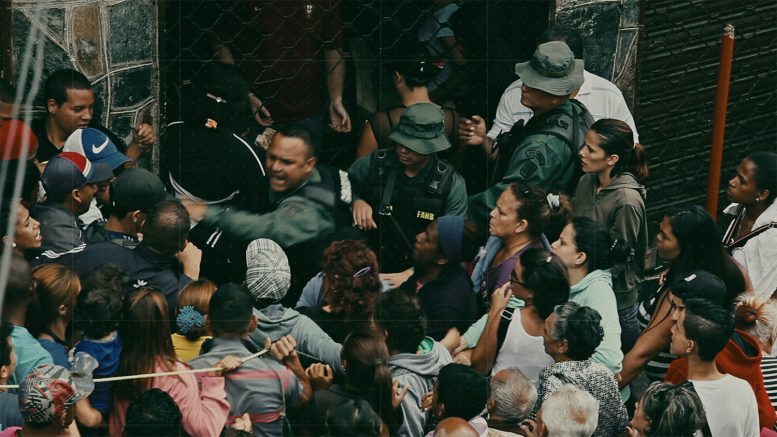‘The Grab’ director Gabriela Cowperthwaite discusses her documentary that is both a geopolitical thriller and a call to action.
By Alex Demyanenko, Capital & Main
This story is produced by the award-winning journalism nonprofit Capital & Main and co-published here with permission.
Throughout history, we have witnessed the fierce pursuit of valuable commodities such as spices, gold, wheat, cotton and oil. Gabriela Cowperthwaite’s new documentary, The Grab, reveals that nations and multinational corporations are now urgently scouring the globe to hoard and control an even more crucial resource: water.
Cowperthwaite directed the acclaimed 2013 documentary Blackfish, which investigated the death of a SeaWorld trainer, highlighted the mistreatment of orca whales in captivity, and ultimately led to SeaWorld ending its orca shows.
The Grab (streaming and in select theaters June 14) follows investigative reporter Nathan Halverson and his team from the Center for Investigative Reporting. Together, they have traveled the globe, from Arizona to Zambia, to shed light on the covert acquisition of water-rich lands. As global warming intensifies and water resources dwindle, these areas are becoming hotbeds for profit-driven companies and for nations desperate to sustain their populations.
This film reveals how a Chinese company backed by the government bought the American company Smithfield Foods; now China owns one in four pigs raised in the U.S. In Arizona, a Saudi-owned 10,000 acre hay farm has been using massive amounts of water in the middle of the desert and exporting the hay back to the Kingdom. And former mercenary and Blackwater Security Company founder Erik Prince is leading a group of Chinese investors on a hunt for natural resources and investment opportunities by snatching up land in Zambia and other African countries.
Cowperthwaite recently spoke to Capital & Main about her intention to craft The Grab as a geopolitical thriller and the formidable challenges of documenting the global struggle for this increasingly precious resource.
This interview has been edited for clarity and brevity.

Question: What was your approach to covering this complex issue of foreign interests grabbing up land with water resources around the world?
Gabriela Cowperthwaite: What I felt like I wanted to do was create a geopolitical thriller. I feel like there are people who need to hear about what’s happening with the grabbing of resources on the planet and need to hear it from the position of power and from the perspective of power. And if we do that, there is a possibility of getting half of this country to see themselves inside this story if we frame it in the context of power rather than going back to Blue State catch words like “environmentalism,” “global warming” and “climate change,” because they turn off the TV if they see those words.
So I wanted to find access points that are human and personal to folks that are not in the environmental echo chamber. Finding a way to humanize this issue and put it in a context that they can relate to, which is powerful people surrounding them, making decisions that are going to destroy their livelihoods and communities.
Right, like the Arizona farmers in the film having their water dry up because a massive plot of land owned by the Saudis is using much of the groundwater. But how do you get authoritarian countries like China and Saudi Arabia to stop buying up huge plots of land in places like Africa?
It’s not just “Oh, there’s these insidious countries and these dark countries and they’re adversarial and they’re doing these bad things.” First of all, we’re doing the same thing. Wall Street, United States, Western Europe, we’re all doing that. And second, they’re fighting for survival just as much as we are. And I think this is the most Sisyphean answer that you’ll ever get, but in my mind there are many, many things to do.
One of the most important, and, I guess, jarring moments for me in the film is when [Chinese leader] Xi Jinping revealed he ate raw pork as a kid [because he was starving]. And for me, it changed everything for me in terms of how I made this film. And that was because if there is someone who has understood starvation at that level — and I’m not talking about feeling hungry, I’m talking about just mass starvation — and that person is now essentially in charge of a country, it is the purview of that leader now to make sure that doesn’t happen again.
So it gives you hope that you saw a glimmer of vulnerability in the world’s most powerful authoritarian leader.
I think that’s right. I think if I had gone through what he went through, perhaps I’d make similar decisions. We must see ourselves in each other for anything to make sense about how we do life. And so I think that’s why I got into documentary, and that’s what I love about documentaries.
But if powerful countries secure resources for themselves, won’t smaller, poorer nations suffer disproportionately?
Yes, it will disproportionately affect them. Smaller countries will be hit faster with the ramifications of some of it, but nobody gets out alive is the thing. This is [like] OPEC right? Look at the wars we fought over oil and think about what that would be like over food and water. If all these powerful nations do this, and they control the levers of food and water, that’s going to affect everybody negatively.
And if one country fails, whether it’s Zambia or China, we are going to feel it in our food prices. We’re going to feel it geopolitically. We’re completely interconnected. If Zambia starves, that isn’t just a human rights issue. That means disease, and that disease does not respect national borders, as we’ve seen recently. That means refugees. And it means conflict. And that’s geopolitical conflict, because now that’s happening in a place that the world has deemed as a final breadbasket. We’re going to have to go into conflict with countries in areas that are deemed incredibly geopolitically important and are valuable for water, for the future of food. It’s going to affect them. It’s going to affect us. It’s going to affect everybody.
What surprised you the most in making this film?
What I was the most surprised of was the fear. It was purely the fear. The Saudi cables that suggested that they were terrified that the Arab Spring was going to come to them. Food prices go up, we’re in trouble. Look at what people can do on the streets. Same with China. Fear. They don’t admit it inside their country that there was a great famine [from 1959-1961]. They call it natural disaster, but they remember their grandparents starving. So it’s sort of like it’s fear and a lot of it.
Speaking of fear, there was a moment in the film when the crew thought they may be being bugged. Did you guys ever fear for your life, or do you fear for your life now? And are you taking any steps to mitigate that?
So while we were making the film was the scariest part, I think because you don’t yet have a film, which means the people you are talking to could be in trouble. You could be in trouble. And then if someone does something to you, there’s no smoking gun because you don’t have a film out yet. So that period of time was very scary and very, very sensitive. Our information was on an air gap computer [such a computer is physically separated from and not capable of connecting to other computers or networks]. As you can see, Nate [Halverson] was putting glue into the ports and everything. So we were scared at that point.
Do I think that I was in danger? There was a moment in Zambia where I imagined anything could happen to me and it could just be anyone’s fault. Because everything works in the shadows in those places and the mercenaries operate with plausible deniability. So that was scary.
I think what’s scarier and what I’m worried about and was always worried about is someone like Brig [a local Zambian activist in the film]. He’s in the shadows. He’s there surrounded by people who might just say, you’re hurting our profits. It could be people inside Zambia, it could be Zambians, and it could also be mercenaries working on behalf of big governments.
There’s a huge implication in the film that Ukraine was invaded by Russia because they had dammed a water source from flowing into Crimea. Do you really think water was the primary reason behind the current conflict?
It was certainly a big catalyst that nobody talks about. But is it the only catalyst? I don’t think so. I think there’s always a lot of calculated risk that someone like Putin’s going to take, and he’s going to come into that situation for a number of reasons. But the water thing, we felt like it was not given enough attention, especially when you really look at Ukraine being the biggest bread basket in the world and the biggest feeder of poverty stricken nations in the world. So it was something that bore mentioning.
Blackfish had a tremendous real-world impact. How important is it for you to create change with your films?
I think Blackfish made me realize that you can effect change through a film. And I think that it almost looms over me as a promise that I feel like I’m making when I make my films. Yes, I do hope that it effects change. I don’t go into the nuts and bolts of the filmmaking thinking that, because then I’m creating a 90-minute 1-800 number, and so the impetus when I’m making a film is to make it entertaining and help you learn. But once it’s finished, then I sort of catapult to another sphere, and that’s to get people to do life better, to make us do something after we feel something. So it’s an added pressure I think that I just give to myself. I just feel like that’s my lane because of what I saw happening with my own experience with Blackfish.
So ultimately what’s the change you want to engender with this film?
Let’s create a national water center that’s going to synthesize all the information about water. There is no national water policy because we’re a federalist country. It’s all state, right? So what we need to understand is how much water we have, which is something else we don’t know as a nation. We have groundwater, we know rivers, but we don’t know how much water we have and where it is. And that information is starting to become available and could become more available. So once we have that, we should create an agency or a national water center that’s really a clearinghouse for information.
It’s such a ridiculous pie in the sky dream. But now I have it, and so I want to just at least try to do that. So I don’t think I can leave this one because it is so ongoing and there’s no sort of decisive end to it. There is no “OK, now everybody’s fine and has water.” It’s continuing because, as someone said, the discussion about water constantly fluctuates, because water constantly fluctuates.
Copyright 2024 Capital & Main


I have been banging the gong about this for decades! Don’t forget, we can’t live without WATER! Remember Soylent Green.